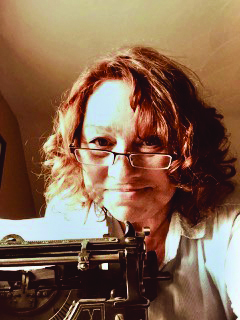

Linda Dobkins who writes as Jo Allison sits at her typewriter.
Linda Dobkins (who uses the pen name Jo Allison) started her career as a journalist, became an economics professor and in retirement has returned to her first love – writing.
“I actually began my career as a writer when I was 20—but not writing fiction. I got my associate degree in journalism and worked in broadcasting and the newspaper world for 10 years. I have to say that my later-in-life career in teaching was more creative than covering courts and crime and city councils. Teaching is always a creative endeavor.
“I began writing fiction after I finished my Ph.D. at Virginia Tech and while I was teaching at Emory & Henry College. In 1999 my husband, then a professor at Radford University, had a brain hemorrhage, which he—amazingly and thankfully—survived. But when we could no longer spend our spare time hiking the Blue Ridge or motorcycling the countryside, I took the opportunity to ask myself if there was anything I wanted to try. And writing historical fiction was the answer.
“Even as my husband recovered, we were still making twice-yearly trips to check on his parents. I’m from Joplin, Missouri, a small city about the size of Kingsport in the Southwestern part of the state, and my husband grew up on a farm/ranch just across the Kansas line. So, these trips took a good deal of our time. On the way there, we often stopped in St. Louis; we’re huge baseball fans so summer visits to Busch Stadium were obvious. But once I decided to write fiction, I began to spend hours in St. Louis libraries and driving the city to learn what it was like in 1910,” Dobkins says.
Her Julia Nye mystery series is set in St. Louis in the 1910s. Nye is a typist for the St. Louis police but wants to be a detective. She has two sidekicks, male newspaper reporters who draw on Dobkins’ newspaper background. She wrote three novels about this woman by 2007.
“The folks in my novels rode in the first cars, talked on the first telephones, saw the first airplanes. Social change ranging from prohibition to women in labor unions implies social unrest, and that is fertile ground for tension in telling their stories. Issues of the day including prohibition, race relations (through the lens of ragtime), human trafficking, labor relations, all play out.”
Her job at Emory & Henry College got busier and her writing became more academically oriented. In addition to teaching, she directed the development of a new core curriculum and spent a year as interim vice president for academic affairs and dean of the faculty. Her fiction went into an electronic drawer and stayed there until she retired in 2014.
“During those years I did manage to publish; my last two academic articles were economic histories of women seeking the vote in St. Louis—based on all that research I’d done for the novels.
“I don’t think I wasted a day after retirement before I dug out the previous books and started writing two new ones. I adopted the pen name Jo Allison because heaven forbid anyone should go looking for Linda Dobkins and find some impenetrable article on the econometrics of city growth. Josephine Allison is the maiden name of my great-grandmother.
“I self-published the series, and that was likely a mistake, but in defense of the folks who recommended it, I should say that the publishing industry was—and is—changing so quickly that good advice one day is bad advice the next. One of my other efforts was a website (aside from my author website) that explores some of the background history I’d put together. That website caught the eye of editors at Globe Pequot Press (a division of Rowman and Littlefield), who sought me out to write a book on St. Louis for their Storied and Scandalous city series. That book, “Storied and Scandalous St. Louis: A History of Breweries, Baseball, Prejudice, and Protest,” written within the confines of the pandemic, came out in 2021.
“I stopped writing the Julie Nye series several years ago determined to learn to write better. It’s not that the series is poorly written. It’s fun, and I think readers enjoy it. But I wanted to see what more I could pick up from study and seminars. I’m currently writing a series set in World War I. That’s required a lot of research, which I love doing.
“Along the way, I’ve benefited from and enjoyed my association with local and St. Louis writing groups. I’m an officer in the Lost State Writers Guild and a member of the Appalachian Authors Guild, as well as the St. Louis chapter of the national organization, Sisters in Crime, which serves women writing murder mysteries. I was encouraged early on when a short story that’s a prequel to the series won a first-place award from the Virginia Writers Club; that was through the AAG. Nowadays I meet weekly with three St. Louis writer friends in a lively critique group. The ability to Zoom across the country really is one of the few benefits of the pandemic.
“It’s a gift to create a new career and a new identity. My careers in journalism and teaching were important in giving back to community; both were very public endeavors. It’s equally fulfilling and challenging to look at a blank page most mornings and fill those pages with people and eras I care about. Just me and the coffee I’ve learned to drink,” she says.
For more information about Dobkins and her books, visit joallisonauthor.com or 1910-stlouis-by-jallison.com.